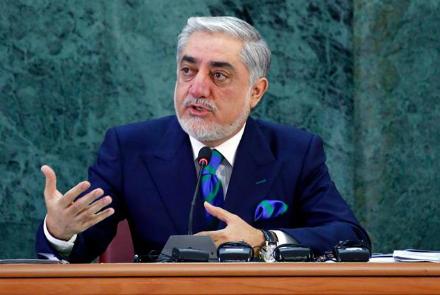Addressing the Council of Minister's meeting on Monday, CEO Abdullah Abdullah has warned that “no one has the authority to threaten the election commission and if someone threatens the commission it would be the end of democracy.”
“Election commission is independent and has a responsibility to hold the elections. It’s our responsibility to provide the facilities for the holding of the elections,” Abdullah said.
His comments come after the Independent Election Commission (IEC) deputies and two commissioners on Sunday told TOLOnews that the decision to stamp copies of voter ID cards is illegal and that they are against the move.
The commissioners refused to talk on camera but said the decision was made by President Ashraf Ghani and IEC chief Abdul Badi Sayyad.
The commissioners said only Sayyad and another commissioner agreed to the decision, but they, the four commissioners, were opposed to the move.
In the meantime, Abdullah said that “today the members of the IEC say that they are under pressure and decisions are being imposed on them including thisissue (copy of the ID),” adding that “no one has the authority to undermine the independence of the election commission.”
“In the future people would be nominees for the upcoming election and so they could also put pressure on election commission? This is not acceptable for the people and is in fact undermining the sacrifices of the people of Afghanistan who are defending this government,” he said.
He also said the elections are facing security issues and that “the people are also giving sacrifices for it and the people of Afghanistan are taking a risk to register. I am saying responsibly that no pressure must be imposed on the election commission. The election commission makes the decisions and are responsible for transparent elections.”
On Sunday, the IEC’s operational deputy head Wasima Badghisi, IEC financial and administrative deputy head Mazaaullah Dawlati, and IEC commissioners Abdul Qadir Quraishi and Maliha Hassan are the four commissioners who oppose the IEC chief and Ghani’s new decision regarding the voter registration process.
The four commissioners have signed a letter in which they said they are against the move. According to them, based on the election law the commission does not have the authority to shift or amend electoral approaches during the election process.
The commissioners said they have signed a letter in front of representatives of the United Nations in Kabul and Shahla Haq, acting secretariat of IEC to announce their disagreement over the decision to stamp copies of voters ID cards.
The IEC Chief however refused to comment in this regard.
The issue of stamping copies of voter ID cards was first announced by the Presidential Palace last Thursday and then published on the election commission’s website.
A number of MPs and politicians then blasted President Ashraf Ghani over what they said was an attempt to pressurize the IEC and impose plans on the commission.


